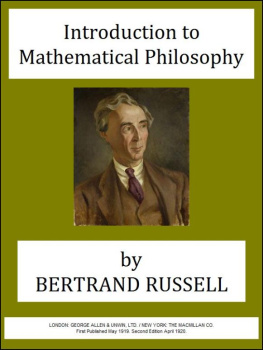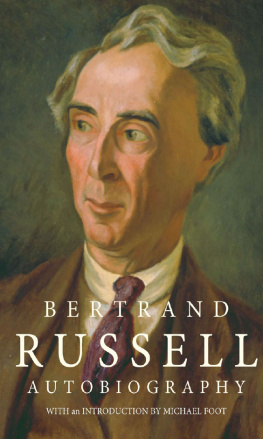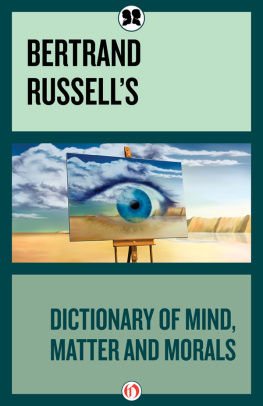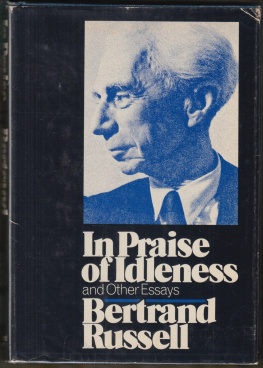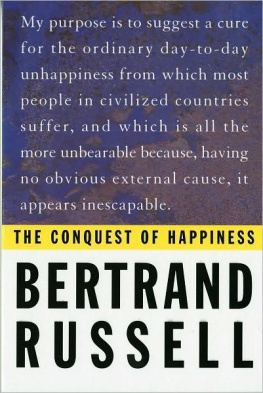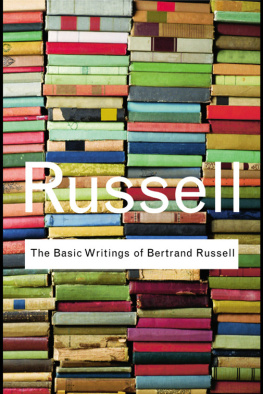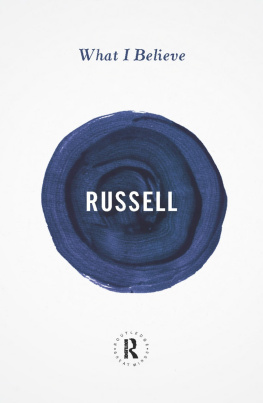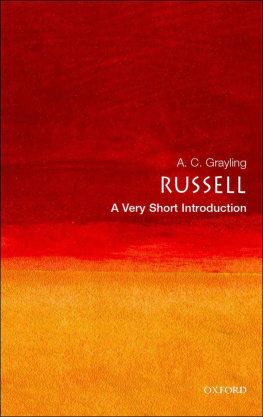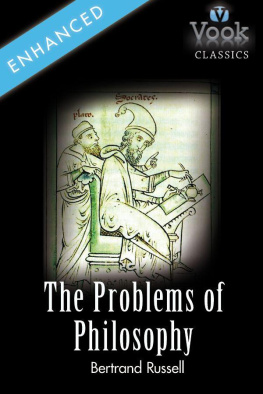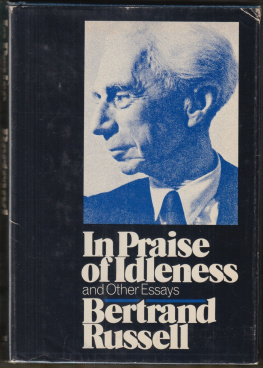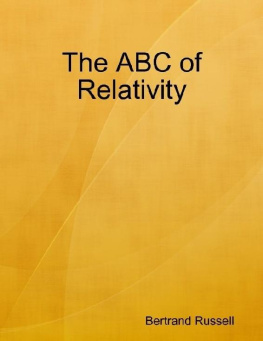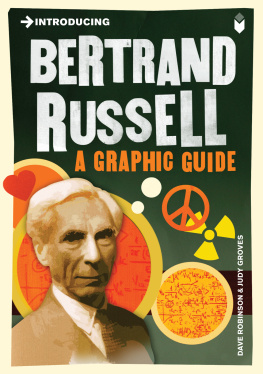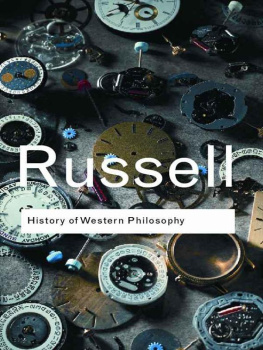Bertrand Russell - Introduction to Mathematical Philosophy
Here you can read online Bertrand Russell - Introduction to Mathematical Philosophy full text of the book (entire story) in english for free. Download pdf and epub, get meaning, cover and reviews about this ebook. genre: Romance novel. Description of the work, (preface) as well as reviews are available. Best literature library LitArk.com created for fans of good reading and offers a wide selection of genres:
Romance novel
Science fiction
Adventure
Detective
Science
History
Home and family
Prose
Art
Politics
Computer
Non-fiction
Religion
Business
Children
Humor
Choose a favorite category and find really read worthwhile books. Enjoy immersion in the world of imagination, feel the emotions of the characters or learn something new for yourself, make an fascinating discovery.
- Book:Introduction to Mathematical Philosophy
- Author:
- Genre:
- Rating:4 / 5
- Favourites:Add to favourites
- Your mark:
- 80
- 1
- 2
- 3
- 4
- 5
Introduction to Mathematical Philosophy: summary, description and annotation
We offer to read an annotation, description, summary or preface (depends on what the author of the book "Introduction to Mathematical Philosophy" wrote himself). If you haven't found the necessary information about the book — write in the comments, we will try to find it.
Introduction to Mathematical Philosophy — read online for free the complete book (whole text) full work
Below is the text of the book, divided by pages. System saving the place of the last page read, allows you to conveniently read the book "Introduction to Mathematical Philosophy" online for free, without having to search again every time where you left off. Put a bookmark, and you can go to the page where you finished reading at any time.
Font size:
Interval:
Bookmark:
by
BERTRAND RUSSELL
LONDON: GEORGE ALLEN& UNWIN, LTD.
NEW YORK: THE MACMILLAN CO.,
First published May 1919
Online Corrected Edition version 1.0 (January 31, 2010), based on the second edition (second printing) of April 1920, incorporating additional corrections, marked in green .
[Russells blurb from the original dustcover:]
This book is intended for those who have no previous acquaintance with the topics of which it treats, and no more knowledge of mathematics than can be acquired at a primary school or even at Eton. It sets forth in elementary form the logical definition of number, the analysis of the notion of order, the modern doctrine of the infinite, and the theory of descriptions and classes as symbolic fictions. The more controversial and uncertain aspects of the subject are subordinated to those which can by now be regarded as acquired scientific knowledge. These are explained without the use of symbols, but in such a way as to give readers a general understanding of the methods and purposes of mathematical logic, which, it is hoped, will be of interest not only to those who wish to proceed to a more serious study of the subject, but also to that wider circle who feel a desire to know the bearings of this important modern science.
We dealt in the precedingchapterwiththe words all and some ;in thischapter we shall consider the word the in the singular, and in the nextchapter we shall consider the word the in the plural. It may be thoughtexcessive to devote two chapters to one word, but to the philosophicalmathematician it is a word of very great importance: like BrowningsGrammarian with the enclitic , I would give the doctrine of this wordif I were dead from the waist down and not merely in a prison.
We have already had occasion to mentiondescriptivefunctions, i.e. such expressions as the father of x or the sine of x .These are tobe defined by first defining descriptions.
A description may be of two sorts,definite and indefinite(orambiguous). An indefinite description is a phrase of the form aso-and-so, and a definite description is a phrase of the form theso-and-so (in the singular). Let us begin with the former.
Who didyou meet? I met a man. That is a very indefinite description. Weare therefore not departing from usage in our terminology. Our questionis: What do I really assert when I assert I met a man? Let us assume,for the moment, that my assertion is true, and that in fact I metJones. It is clear that what I assert is not Imet Jones. I maysayI met aman, but it was not Jones; in that case, though I lie, I do notcontradict myself, as I should do if when I say I met a [page 168] man I reallymean that I met Jones. It is clear also that the person to whom I amspeaking can understand what I say, even if he is a foreigner and hasnever heard of Jones.
But we may go further: not only Jones,but no actual man,enters intomy statement. This becomes obvious when the statement is false, sincethen there is no more reason why Jones should be supposed to enter intothe proposition than why anyone else should. Indeed the statementwould remain significant, though it could not possibly be true, even ifthere were no man at all. I met a unicorn or I met a sea-serpent isa perfectly significant assertion, if we know what it would be to be aunicorn or a sea-serpent, i.e. what is the definition of these fabulousmonsters. Thus it is only what we may call the concept that entersintothe proposition. In the case of unicorn, for example, there is onlythe concept: there is not also, somewhere among the shades, somethingunreal which may be called a unicorn. Therefore, since it issignificant (though false) to say I met a unicorn, it is clear thatthis proposition, rightly analysed, does not contain a constituent aunicorn, though it does contain the concept unicorn.
The question of unreality, whichconfronts us at thispoint,is avery important one. Misled by grammar, the great majority of thoselogicians who have dealt with this question have dealt with it onmistaken lines. They have regarded grammatical form as a surer guide inanalysis than, in fact, it is. And they have not known what differencesin grammatical form are important. I met Jones and I met a manwould count traditionally as propositions of the same form, but inactual fact they are of quite different forms: the first names anactual person, Jones; while the second involves a propositionalfunction, and becomes, when made explicit: The function I met x and x ishumanis sometimes true. (It will be remembered that we adoptedthe convention of using sometimes as not implying more than once.)This proposition is obviously not of the form I met x , whichaccounts [page 169] for theexistence of the proposition I met a unicorn inspite of the fact that there is no such thing as a unicorn.
For want of the apparatus ofpropositional functions, manylogicianshave been driven to the conclusion that there are unreal objects. It isargued, e.g. by Meinong, that we canspeak about the goldenmountain, the round square, and so on; we can make true propositionsof which these are the subjects; hence they must have some kind oflogical being, since otherwise the propositions in which they occurwould be meaningless. In such theories, it seems to me, there is afailure of that feeling for reality which ought to be preserved even inthe most abstract studies. Logic, I should maintain, must no more admita unicorn than zoology can; for logic is concerned with the real worldjust as truly as zoology, though with its more abstract and generalfeatures. To say that unicorns have an existence in heraldry, or inliterature, or in imagination, is a most pitiful and paltry evasion.What exists in heraldry is not an animal, made of flesh and blood,moving and breathing of its own initiative. What exists is a picture,or a description in words. Similarly, to maintain that Hamlet, forexample, exists in his own world, namely, in the world of Shakespearesimagination, just as truly as (say) Napoleon existed in the ordinaryworld, is to say something deliberately confusing, or else confused toa degree which is scarcely credible. There is only one world, thereal world: Shakespeares imagination is part of it, and the thoughtsthat he had in writing Hamlet are real. So are the thoughts that wehave in reading the play. But it is of the very essence of fictionthat only thethoughts,feelings, etc., in Shakespeare and his readers are real, and that thereis not, in addition to them, an objective Hamlet. When you have takenaccount of all the feelings roused by Napoleon in writers and readersof history, you have not touched the actual man; but in the case ofHamlet you have come to the end of him. If no one thought about Hamlet,there would be nothing [page 170] left of him; if no one had thought aboutNapoleon, he would have soon seen to it that some one did. The sense ofreality is vital in logic, and whoever juggles with it by pretendingthat Hamlet has another kind of reality is doing a disservice tothought. A robust sense of reality is very necessary in framing acorrect analysis of propositions about unicorns, golden mountains,round squares, and other such pseudo-objects.
In obedience to the feeling of reality,we shall insistthat,in theanalysis of propositions, nothing unreal is to be admitted. But,after all, if there is nothing unreal, how, it may be asked, could weadmit anything unreal? The reply is that, in dealing with propositions,we are dealing in the first instance with symbols, and if we attributesignificance to groups of symbols which have no significance, we shallfall into the error of admitting unrealities, in the only sense inwhich this is possible, namely, as objects described. In theproposition I met a unicorn, the whole four words together make asignificant proposition, and the word unicorn by itself issignificant, in just the same sense as the word man. But the two words aunicorn do not form a subordinategroup having a meaningof itsown. Thus if we falsely attribute meaning to these two words, we findourselves saddled with a unicorn, and with the problem how there canbe such a thing in a world where there are no unicorns. A unicorn isan indefinite description which describes nothing. It is not anindefinite description which describes something unreal. Such aproposition as x is unreal only has meaning when x is adescription, definite or indefinite; in that case the proposition willbe true if x is a description which describes nothing. But whetherthe description x describes something or describes nothing, it is inany case not a constituent of the proposition in which it occurs; likea unicorn justnow, it is not a subordinate group having a meaning ofits own. All this results from the fact that, when x is adescription, x is unreal or x does not exist is not nonsense, butis always significant and sometimes true.
Font size:
Interval:
Bookmark:
Similar books «Introduction to Mathematical Philosophy»
Look at similar books to Introduction to Mathematical Philosophy. We have selected literature similar in name and meaning in the hope of providing readers with more options to find new, interesting, not yet read works.
Discussion, reviews of the book Introduction to Mathematical Philosophy and just readers' own opinions. Leave your comments, write what you think about the work, its meaning or the main characters. Specify what exactly you liked and what you didn't like, and why you think so.

